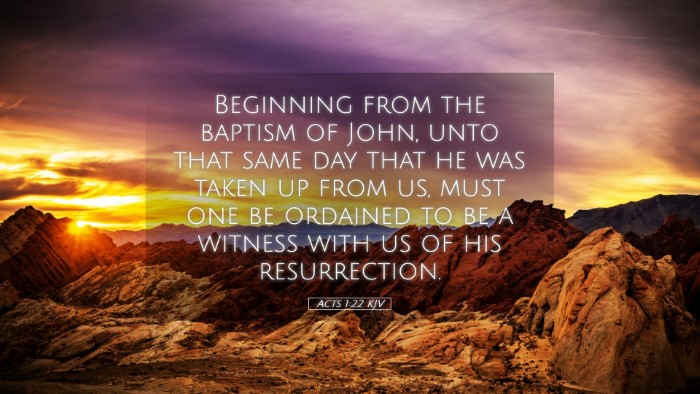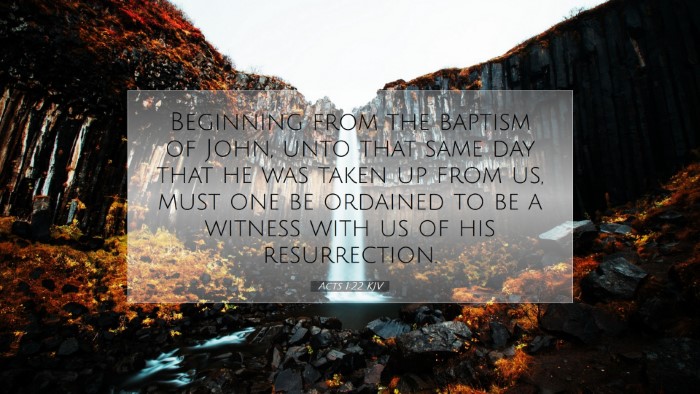Old Testament
Genesis Exodus Leviticus Numbers Deuteronomy Joshua Judges Ruth 1 Samuel 2 Samuel 1 Kings 2 Kings 1 Chronicles 2 Chronicles Ezra Nehemiah Esther Job Psalms Proverbs Ecclesiastes Song of Solomon Isaiah Jeremiah Lamentations Ezekiel Daniel Hosea Joel Amos Obadiah Jonah Micah Nahum Habakkuk Zephaniah Haggai Zechariah MalachiActs 1:22
Acts 1:22 KJV
Beginning from the baptism of John, unto that same day that he was taken up from us, must one be ordained to be a witness with us of his resurrection.
Acts 1:22 Bible Commentary
Acts 1:22 Commentary Summary
Verse: Acts 1:22 - "Beginning from the baptism of John, unto that same day that he was taken up from us, must one be ordained to be a witness with us of his resurrection."
Introduction
Acts 1:22 falls within a crucial transitional moment in the early church as the apostles seek to fill the vacancy left by Judas Iscariot. This verse emphasizes the necessity of witnesses to the resurrection of Jesus, highlighting the significance of resurrection in Christian theology and the qualifications for leadership within the early church.
Contextual Background
Prior to this selection of a new apostle, Jesus had ascended, signaling the beginning of a new phase in the church's mission. The apostles, filled with the Holy Spirit, were to become the principal witnesses of Christ’s life, death, and resurrection. The narrative here seeks to establish the foundational requirements for apostolic leadership.
The Role of Witnesses
The term "witness" carries significant weight in the context of first-century Judeo-Christian discourse. A witness ("martus" in Greek) not only confirms a fact but also bears testimony with personal conviction and authority. Apostolic witnesses were tasked with proclaiming the resurrection as a cornerstone of faith.
- Importance of the Resurrection: The resurrection affirms Jesus' divinity and the truth of His teachings. Acts 1:22 aligns with the broader apostolic mission of preaching the resurrection, which is central to the Christian faith (1 Corinthians 15:14).
- Qualifications for Apostolic Witness: This selection was not arbitrary; it required firsthand experience of Jesus’ ministry from the baptism of John through the resurrection, emphasizing the continuity of the apostles’ mission.
Commentary Insights
Matthew Henry
Matthew Henry highlights that the apostles recognized the importance of maintaining the integrity of their group. He notes that the new apostle must not only replace Judas but also fulfill the role of a witness with authority, thus reinforcing the apostolic testimony about Christ's resurrection.
Albert Barnes
Albert Barnes focuses on the significance of starting from John’s baptism. He explains that the new apostle being chosen must have been a participant in the earthly ministry of Jesus from its inception, allowing him to authenticate His messages and actions. This reflects the importance of continuity between the baptismal and post-resurrection eras.
Adam Clarke
Adam Clarke expands on the qualifications of a witness, noting that one must have not only witnessed the events but also been transformed by them. Clarke suggests that the authority given to the apostles came from their direct experiences with Christ, which is essential for effective ministry and proclaiming the early church's message.
Theological Implications
Theological insights emerge from Acts 1:22, particularly concerning the nature of Christian witness and the apostolic foundation of the church. In establishing witnesses of the resurrection, the verse serves to affirm that the church's mission is rooted in the historical and experiential realities of Jesus’ ministry.
- Apostolic Authority: The apostles were not self-appointed; their authority stemmed from their experiences. This establishes a precedent for leadership that is biblically grounded and experiential.
- The Mission of the Church: The church's mission derives from the resurrection, and every believer is called to engage in some form of witnessing to this truth (Matthew 28:19-20).
Practical Applications
For pastors, students, theologians, and scholars, Acts 1:22 can serve as a reflection on the qualities required for effective leadership and ministry within the church today. The following applications stand out:
- Emphasis on Experience: Leaders should have a personal relationship with Christ and a profound understanding of the gospel, ensuring their ministry is grounded in firsthand experience of His grace.
- Witnessing as a Core Activity: The church must prioritize witnessing in its various forms, emphasizing the resurrection as the linchpin of Christian belief and practice.
- Integrity in Leadership: Just as the apostles took care in selecting their leaders, contemporary churches should be diligent in the appointment of leaders who genuinely embody the teachings of Christ and are committed to the mission of the church.
Conclusion
Acts 1:22 serves as a pivotal verse in understanding the foundational work of the early church. The necessity of witnesses to the resurrection is a key element for the ongoing mission of the church and informs contemporary views on leadership, community, and faithfulness to the gospel.


